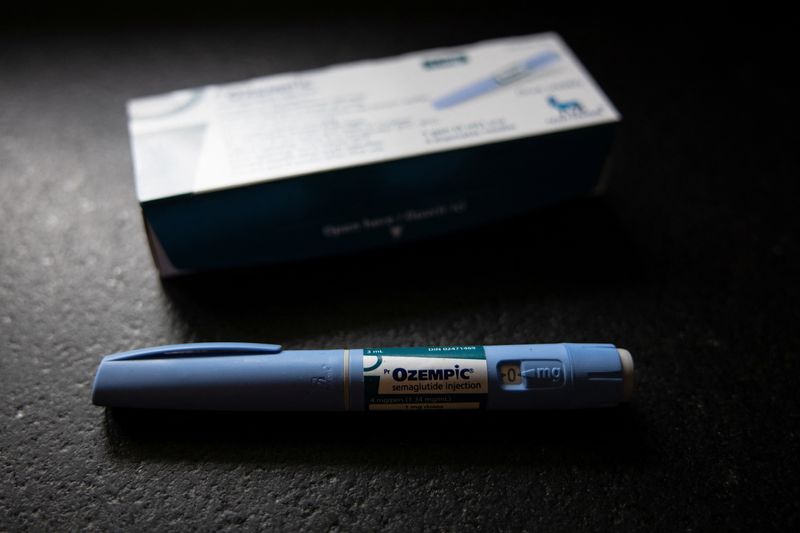While taking Ozempic, a widely-used medication for diabetes and obesity, Dawn Heidlebaugh experienced a troubling pattern. Every Sunday, the 53-year-old Ohio real estate agent took her weekly injection to manage her blood sugar. Subsequently, every Tuesday, she began feeling lethargic, depressed, and sometimes even had suicidal thoughts, questioning whether her family would be better off without her. These feelings persisted for several days, forming a recurring cycle that coincided with her medication schedule.
Heidlebaugh, who had never experienced depression before, was one of four patients in the United States who reported experiencing suicidal thoughts while taking Novo Nordisk’s Ozempic or Wegovy, another Novo Nordisk drug approved for weight loss. A fifth patient reported experiencing depression and suicidal thoughts after taking Mounjaro, a similar diabetes medicine from Eli Lilly, which is also used for weight loss. All three drugs belong to the GLP-1 receptor agonists class, which slows digestion and reduces hunger.
A review of the U.S. Food and Drug Administration’s (FDA) adverse-event database conducted by Reuters found 265 reports of suicidal thoughts or behavior in patients taking these drugs or similar medicines since 2010, with 36 of these reports describing suicide or suspected suicide cases. The FDA is monitoring these reports to determine whether further investigation and patient warnings are necessary.
Although many beneficial drugs have rare and potentially dangerous side effects, it is crucial for regulators and physicians to carefully assess and manage these risks, emphasizing the importance of clear warnings. Thomas J. Moore, a faculty associate at the Johns Hopkins Bloomberg School of Public Health, highlighted the need to take patients’ complaints seriously rather than automatically dismissing them.
The Reuters review is the most comprehensive analysis to date of FDA adverse-event reports related to suicidal thinking associated with GLP-1 drugs. Reuters also obtained 113 detailed narratives from the FDA’s database, shedding light on individual incidents among the 265 reports. The experiences of the five patients who shared their stories with Reuters had not been previously reported.
Over half of the narrative summaries indicated that suicidal thoughts emerged shortly after patients began taking the medication or increased the dose, with about 40% reporting that symptoms improved when they stopped taking the drug or reduced the dose.
Out of the 113 narratives, 30 described patients with a history of depression, suicidal thoughts, or other mental health conditions, while five explicitly mentioned that the patient had no prior psychological issues. Most reports did not address patients’ medical histories.
It is essential to note that adverse-event reports serve as an early warning system for the medical community but are not considered definitive scientific evidence. They are submitted by various parties, including doctors, patients, and drug manufacturers, and often lack crucial details.
Novo Nordisk, the maker of Ozempic and Wegovy, expressed its commitment to taking all adverse event reports seriously and continuing to collaborate with authorities. The company stated that it remains confident in the benefit-risk profiles of its products and that its safety monitoring has not identified a causal association between the drugs and self-harm thoughts.
Eli Lilly, the manufacturer of Mounjaro, mentioned its cooperation with regulators on potential safety issues associated with the drug and its ongoing review of data related to suicidal ideation, self-harm thoughts, and depression.
Experts, including Dr. Erick Turner, a former FDA medical officer, stressed the significance of cases where patients with no history of depression suddenly experience suicidal thoughts after starting or increasing the medication dosage, especially when symptoms subside upon discontinuation of the drug. Such cases are considered more credible and require regulatory attention.
The scrutiny of GLP-1 drugs has intensified, with European regulators launching an investigation into suicide risk associated with Ozempic, Wegovy, Saxenda, and other GLP-1 drugs. Health agencies in the UK and Canada are also reviewing these drugs’ suicide risk. The drug manufacturers have confirmed their cooperation with these investigations.
The European regulator expects to conclude its review in November and may require warnings on product labels, issue safety restrictions, or request additional safety studies. If the FDA determines that GLP-1 drugs increase suicide risk, it could take similar actions, potentially requiring stronger warnings or black-box warnings, the FDA’s most potent action short of banning a drug.
While clinical trials for Wegovy, Ozempic, and Mounjaro did not initially show suicide risk, doctors remain vigilant for previously undocumented dangers as more patients turn to these drugs for weight loss. Heightened suicide risks have prompted strong warnings on obesity drugs in the past.
Although the U.S. prescribing label for Wegovy recommends monitoring patients for suicidal behavior and advises those with a history of suicide attempts or active suicidal thinking to avoid the drug, no such language appears on the U.S. label for Ozempic, which was initially approved for diabetes treatment in 2017.
Scrutiny of GLP-1 drugs continues, with experts emphasizing the importance of monitoring and responding to adverse events to ensure patient safety.




